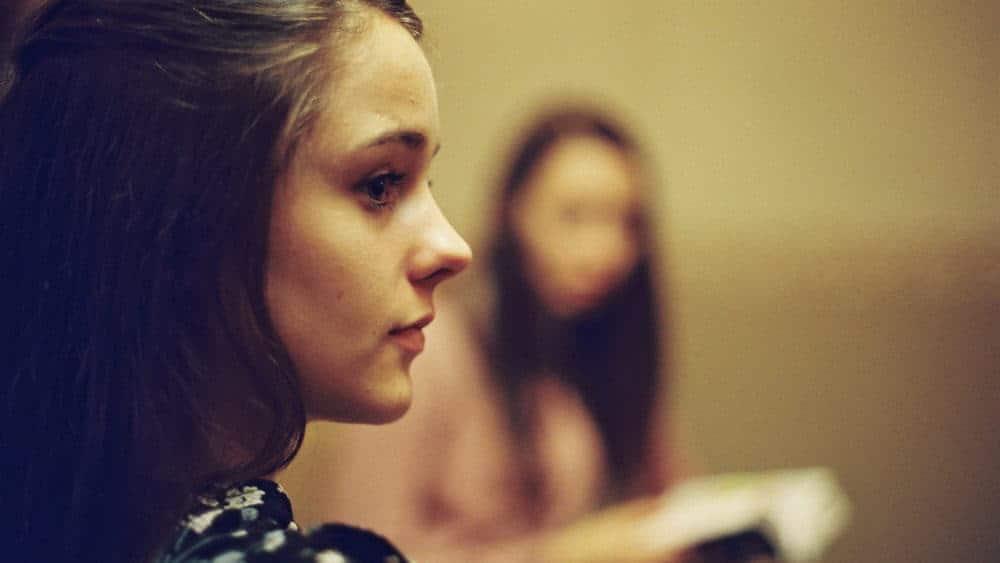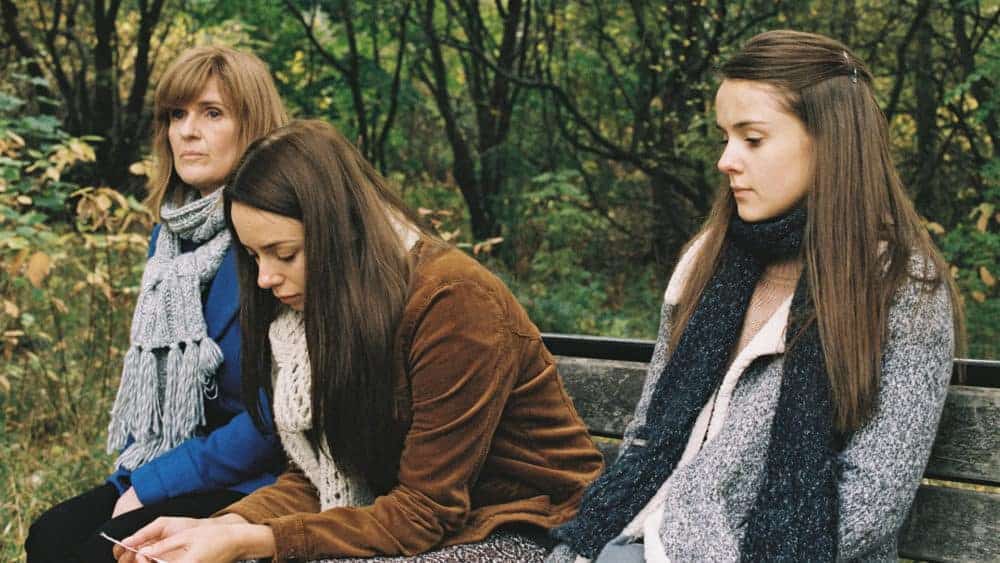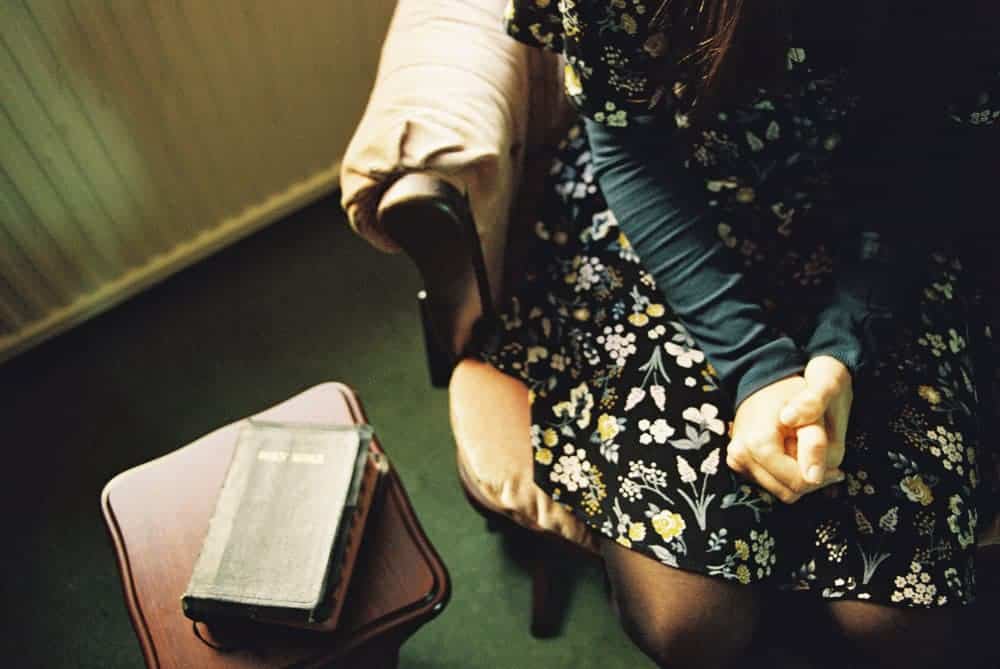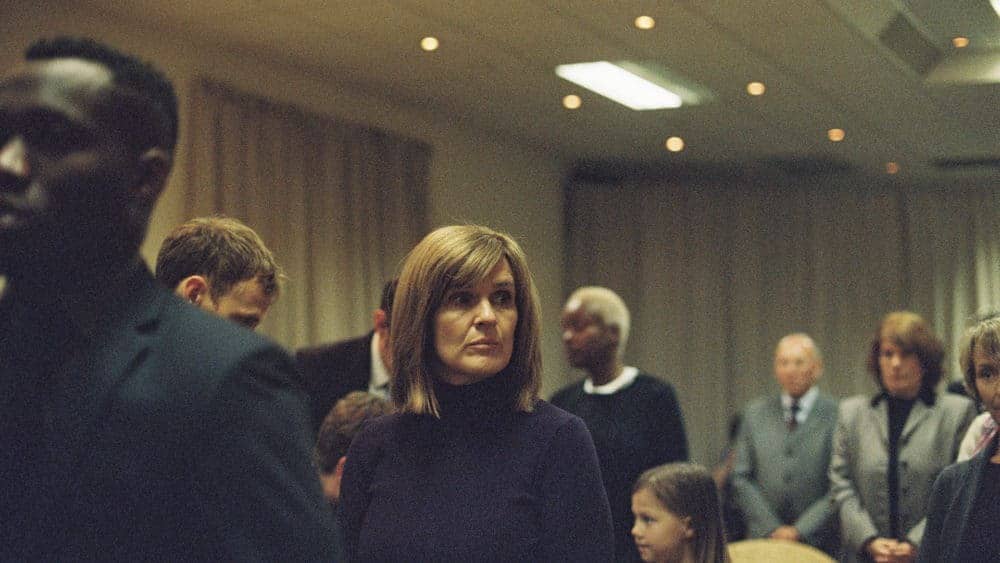Daniel Kokotajlo discusses the autobiographical roots and the making of his feature debut, Apostasy, set in a community of Jehovah’s Witnesses.

In a religious context, ‘apostasy’ is described as the act of giving up your religious beliefs and leaving a religion. It is the title and central topic of Daniel Kokotajlo’s feature debut, Apostasy, centred on a Mancunian family of Jehovah’s Witnesses, which falls apart after the eldest daughter leaves the faith. But the word itself is never mentioned in the film. As Kokotajlo tells us, the term and its meaning are practically taboo amongst those who believe in Jehovah.
Films about faith can often struggle to involve an audience of non-believers. It can be difficult to relate to — or even care about — characters whose pain stems from beliefs that we do not share. Kokotajlo, himself a former Witness, avoids this obstacle by simply, and gracefully, never attempting to explain that which is impossible to explain. A belief, by definition, is something felt and not proven.
Apostasy is not about whether the beliefs of Jehovah’s witnesses are true, or even valid. Rather, the film focuses on the sense of community that faith can bring, and the difficulties involved in leaving that community, but also in remaining faithful to it. When Luisa (Sacha Parkinson) decides to leave the religion; her mother, Ivanna, (Siobhan Finneran) and her sister, Alex (Molly Wright), are torn between their love for her and their love for Jehovah.
Kokotajlo talked to me about focusing on individuals within the religion, centring the experiences of three women, helping the actors stay in character, and crafting the film’s visual style.
Seventh Row (7R): This is quite an autobiographical film, in the sense that you used to be a Jehovah’s Witness yourself. What was your relationship with the faith then, and what is it now?
Daniel Kokotajlo (DK): I grew up as a witness. I attended the meetings when I was a child until a little after university. I spent a long time within the church. A lot of the details within the film are based on things that either happened to me, or that I saw happen to people within the congregation. I slowly faded away from [the religion], but it took me quite a long time before I felt comfortable talking about these things and telling a story. I felt more comfortable once I had quite a lot of distance from it; I was able to be a bit more objective and careful about the kind of story I was going to tell. There are people who have left the religion and were quite mistreated by it, and they are angry about what happened to them; that’s not the case with me. I wanted to create a story that was fair and honest.

I’m trying to tell a story about individuals. But I’m also trying to sort of address spiritual and philosophical matters within the story. At the same time, I’m trying to document or show to secular audiences what happens within this religion. I’m balancing these three different aspects. I was careful not to be too angry against the individuals within the religion. That’s what I feel quite strongly about: I have issues with what the organisation and the governing body — the men who run the religion — are doing, but the individuals within the religion are just trying their best to navigate the situations that they find themselves in. It’s a machine that runs well until there’s a problem. If somebody decides to sneak out, or commit apostasy, or do something that their religion doesn’t like, that’s when these problems occur, and it gets messy and ugly. The elders within the religion are possibly not well educated enough to deal with these situations.
7R: Why did you choose to focus on the experiences of three women?
DK: My mother was the first to join the religion in the family, so she’s the one that drew the rest of my family into the religion. Most of my family are female, as well. Most of what I was observing within the religion concerned what was happening to the women. That was always a concern to me — seeing how old fashioned the religion was in how it sort of repressed women, and in the way the majority of women didn’t even see what was happening to them.
[click_to_tweet tweet=”‘I have issues with what the organisation is doing, but the individuals within the religion are just trying their best to navigate the situations they find themselves in.'” quote=”‘I have issues with what the organisation is doing, but the individuals within the religion are just trying their best to navigate the situations they find themselves in.'”]
There’s also the issue of what happens when people want to separate within the religion. The father figure is absent, but that’s quite a common thing, in my own experience anyway. But it becomes very tricky because they’re not allowed to have a spiritual divorce, so they have to just remain separated. And that’s what happens in the film.
It’s important to look at a character like Luisa, as well. She is a woman, but she’s also very playful, creative, impulsive, and curious about life. From the elders’ point of view, the men who control the church, it’s a type of person that they find hard to understand. They don’t quite know how to judge her. And in a way, they sort of set an example of her because of that.

7R: The characters are very well drawn, and we can sympathise with them. But this also relies on the performances from the actresses and actors. How did you work with them? Did you talk to them a lot about the religion?
DK: It was a micro-budget shoot, but we pushed to have as much rehearsal time as possible. We had about a week where we just sat down and talked about the mindset of a Jehovah’s Witness. That was the hardest thing to explain. You have to go against your natural impulses, as the mother or as the sibling, because of religion. You have this sort of fear of God that makes you do things that don’t feel right inside; it creates this cognitive dissonance between what you feel is right and what you’re told to do. So it was constantly getting that across to the actors.
[click_to_tweet tweet=”‘That was always a concern to me: seeing how old-fashioned the religion was in how it repressed women, and in the way most women didn’t even realise it.'” quote=”‘That was always a concern to me: seeing how old-fashioned the religion was in how it repressed women, and in the way most women didn’t even realise it.'”]
7R: Was it very difficult to make them understand?
DK: It wasn’t difficult, but it required work. The main note that I would give as a director would be about that, about reminding them that what’s actually going on inside them is the logic of the Witness. We could talk together about it, but then as an actor, their instincts would take over and it would take them somewhere else. Occasionally, I’ve had to tell them, “No, that’s not quite it. I understand what you’re doing, but…” For example, when the mother wants her daughter to come back, she might want to reach out and touch her; that might be what you feel inside, but it’s not what you would do on the surface.
7R: There are moments in the film where the actors are talking to Jehovah in their head: we see everything stop around them, and they talk out loud as if only Jehovah could hear them. How did this stylistic element come into the film?
DK: When I first started writing the script, I wasn’t quite sure how to explore the internal logic of the Witnesses. I’d started off writing the story as a prayer from the point of view of Alex [lead character, the younger daughter, played by Molly Wright]. I had a document — a diary almost — of her talking to God, explaining what had happened on each day. I then converted that into a script.
[click_to_tweet tweet=”‘You have this sort of fear of God that makes you do things that don’t feel right inside; it creates this cognitive dissonance between what you feel is right and what you’re told to do.'” quote=”‘You have this sort of fear of God that makes you do things that don’t feel right inside; it creates this cognitive dissonance between what you feel is right and what you’re told to do.'”]
Some of those moments remain because I thought it was important to show what Alex was thinking, feeling, and how she articulated that in a religious context. It was also a good way to show how the witnesses approach prayer as well, it’s quite a casual dialogue with God; it’s very quiet and personal, and you can do it at any point during the day.
7R: Did you have any inspirations for the film’s visual style?
DK: We were looking at a lot of paintings and photography. Michael Borremans was one that I responded well to. He did a series of painting of religious characters that I was quite taken with. They were quite stripped down and very simple, austere looking.
But more importantly, it was just about trying to get across the feel of the community of witnesses, where as a religion, their religious spaces are quite stripped down; they have no iconography, it’s a very quiet and simple space. It was about just taking that as a visual style, as well.

7R: The film opens on Alex being at the hospital for anemia, which struck me as an interesting echo with the yellow tones that dominate her mother’s house and the chapel.
DK: It did affect the way we graded the film. Definitely. We did talk about the sort of sepia tones and the yellowness, and how it perhaps remind you of her problem, in a subconscious way. But initially, it was just about looking at the general colours that we used, to make it quite a bright space. That space is quite clinical, really, more than anything.
7R: How do you think that the witnesses will react to the film?
DK: I don’t really know! I imagine they wouldn’t watch the film. The word alone, ‘apostasy’, is quite a strong, almost dirty word for them. It might put them off. But if they’re curious enough to see it, it comes down to the individual. I can imagine a Witness watching the film and being like “Yeah, what’s wrong with this? It’s perfectly fine, we’re not doing anything wrong here.” Another person might watch it and maybe start to re-assess some of the aspects of the religion.
Part of the reason why I made the film is the hope that someone who’s still in the religion might see what they’re going through articulated on screen. With the distance of cinema, maybe they could start to see what is not quite right about it. While they’re living it, they might not have the distance necessary to be objective about what they’re doing. At the same time, there are millions and millions of people out there who have left the religion, who might like to see their story on screen. I think it’s quite therapeutic and cathartic for people who have been through the disfellowshipping process to see it on screen.
[click_to_tweet tweet=””Someone who’s still in the religion might see what they’re going through articulated on screen, and with the distance of cinema, maybe they could start to see what is not quite right about it.'” quote=”‘Someone who’s still in the religion might see what they’re going through articulated on screen, and with the distance of cinema, maybe they could start to see what is not quite right about it.'”]
7R: Was making the film a cathartic experience for you?
DK: [laughs] No! Not really. I guess it helped me going back to things that I’d ignored in earlier in my life. I felt like I had already dealt with a lot of it, but then, when I started making this film, I realised maybe I hadn’t quite done enough. It was useful in that sense, but I did feel a lot of pressure. Filmmakers feel pressure anyway when they’re making their first film, but I also felt the pressure of wondering how my family or my community were going to react.
7R: Are you thinking of making another feature film? What would it be about?
DK: Yes, I’m working on a few different projects at the moment. But the topic is to be confirmed. I have an interest in modern British stories, so I’m trying to focus on that for now. At the same time, I’m interested in aspects of faith and religion, similar things but in a more abstract way.
Maxime Giroux’s Montreal-set Felix and Meira tells the story of a married Hasidic woman in her early twenties who feels confined by the patriarchal rules of her religion, and considers leaving it. The film actually stars an ex-hasidic Jew and is more sympathetic to the constrictions of the religion than the benefits it offers. The film won the award for Best Canadian Film at the Toronto Film Festival in 2015.

